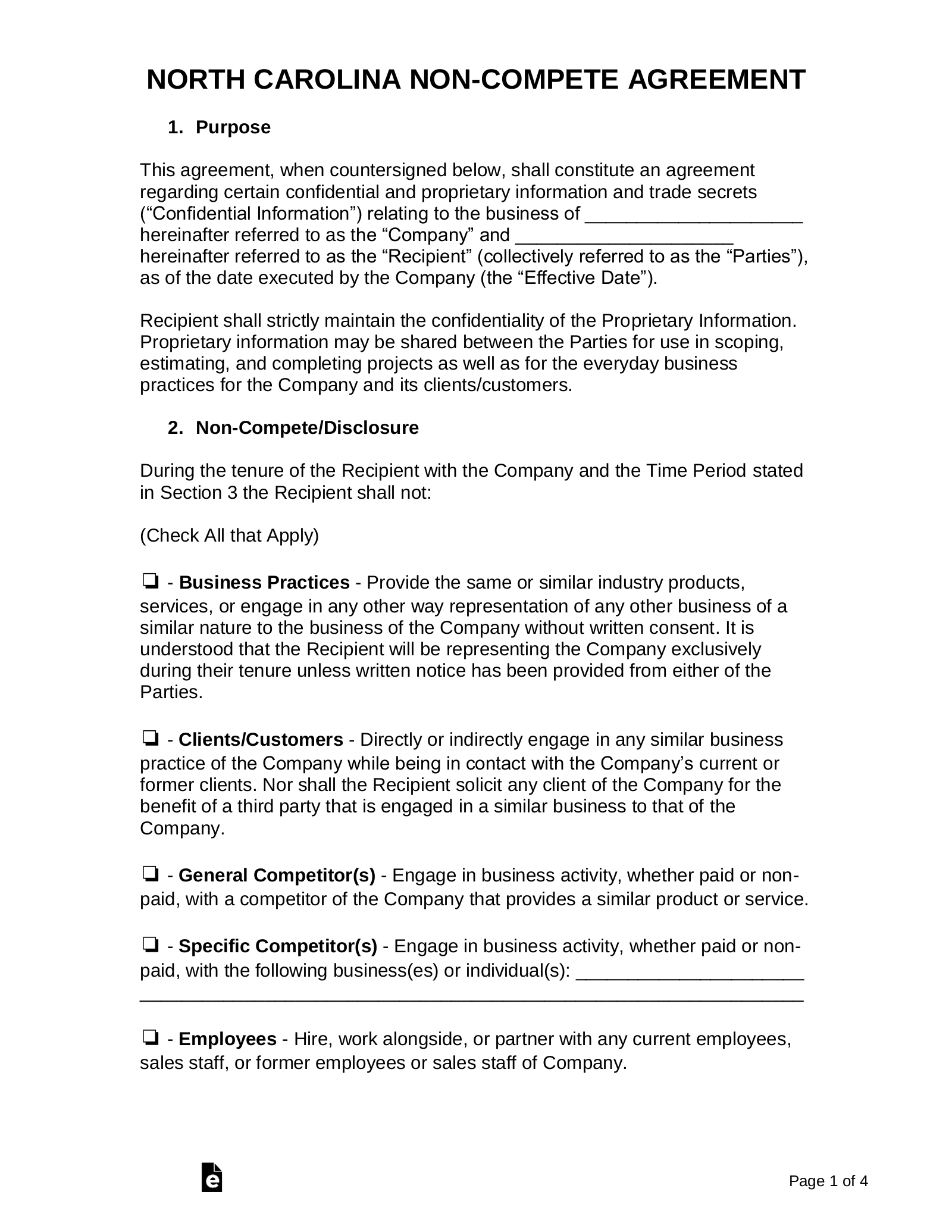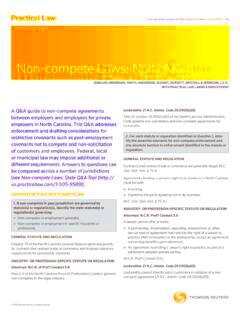Key Points of North Carolina Non-Compete Law
After leaving a job, employees are often bound by non-compete agreements that prohibit them from working for competitors or starting a similar business. Particularly in North Carolina, these agreements can be significant because they have the potential to affect your career and your livelihood. Knowing how to go about them will enable you to manage your professional life with ease.
Basically a non-compete agreement is a contract between an employer and employee that prevents the employee from working for a competitor or starting similar business after leaving their job. The main aim of such agreement is to protect the employer against former employees who may have intimate knowledge about how the business operates. Nevertheless, these contracts are only enforceable if they follow state rules as regards their enforceability. It’s important for both employers as well as employees to know and understand what these contracts entail in North Carolina.
Key Elements of Non-Compete Agreements

In order for a non-compete agreement to be enforceable and valid it should contain several major elements. The most important ones are as follows:
- Purpose: The agreement must have a legitimate business interest, such as protecting trade secrets or customer relationships.
- Scope: The restrictions should be reasonable in terms of geographical area and duration. Overly broad terms may render the agreement unenforceable.
- Consideration: There must be a benefit to both parties, such as a job offer or training, in exchange for signing the agreement.
- Written Agreement: The non-compete must be in writing and signed by both the employer and employee.
Enforceability of Non-Compete Agreements in North Carolina

The constitutionality of non-compete agreements in North Carolina depends on certain legislative parameters. These include, among others, the following criteria for courts to determine their enforceability:
- Reasonableness: The terms must be reasonable in duration and geographic scope. A typical duration ranges from six months to two years.
- Legitimate Business Interest: Employers must demonstrate that the non-compete is necessary to protect their business interests.
- Public Policy: The agreement should not violate public policy, meaning it shouldn’t unfairly restrict a person’s ability to work.
Cautious North Carolina courts are in enforcing non-competes. Courts may modify the terms of an overly restrictive agreement or declare it void. Hence, employers and employees should seek legal advice when drafting such contracts or signing them to comply with the respective state laws.
Limitations on Non-Compete Agreements
It is not possible to have an unrestricted competitive non-agreement. There are specific restrictions that guide the framing and implementation of these contracts in North Carolina. It is very important for employers wanting to safeguard their business interests and employees seeking to confirm that their rights are preserved to know these limitations.
Make sure to consider these key restrictions:
- Reasonableness: The restrictions imposed by the agreement must be reasonable. This means they should not impose an undue hardship on the employee’s ability to find work.
- Legitimate Business Interest: Employers must demonstrate that the restrictions serve a legitimate business purpose, such as protecting trade secrets or proprietary information.
- Not Oppressive: Courts may view agreements as oppressive if they significantly limit an employee’s ability to earn a living.
- State Law Compliance: Non-compete agreements must comply with North Carolina law, which requires that they be written clearly and understood by both parties.
If you do not stick to these boundaries, the agreement might be ruled unenforceable by a court and thereby allowing the employee to seek any job without restrictions. This means that both sides need to examine the conditions as well as their ramifications.
Geographical Restrictions in Non-Compete Agreements
The crucial aspect to look out for in every non-compete agreement is the imposition of geographical restrictions. Such stipulations indicate the region to which an employee is ordinarily barred from getting engaged with any competitor after leaving a position. In North Carolina, such geographical limits have to be sensible and supportable.
Let’s examine what we should take into account in relation to geographical constraints:
- Specificity: The agreement should clearly specify the geographical area covered. Vague terms may lead to unenforceability.
- Market Area: The restricted area should generally align with the employer’s actual market area. A broad restriction beyond this may be challenged.
- Industry Considerations: Different industries may require different geographical scopes. For example, a regional sales manager may have a broader restriction than an employee at a local coffee shop.
In the end, the companies must adjust their geographical boundaries to meet the requirements of the business, but in such a way that they do not impose excessive limitations on the employees’ freedom of work in different places.
Duration of Non-Compete Agreements
The length of time an employee is prevented from working for rivals after quitting his or her job is known as the duration of non-compete agreements. This duration plays a vital role in deciding whether or not this agreement will be enforced in North Carolina.
The following points emphasize on the length of time:
- Typical Durations: Non-compete agreements often range from six months to two years. Courts may view anything longer than this with skepticism.
- Reasonableness: The duration must be reasonable in light of the business interests being protected. A longer duration may be justified in some industries but can be seen as excessive in others.
- Employee’s Role: The duration may also depend on the employee’s role within the company. Higher-level positions may justify longer restrictions due to the sensitive information handled.
Employers need to seek a period that is in between protecting their businesses and allowing the employee to look for another job. An extended length of time may result in the court nullifying the entire contract, thus, utmost caution must be observed.
Exceptions to Non-Compete Agreements
Although non-competition contracts may seem very limiting, there are particular variations that could help workers deal with their career situations in North Carolina. It is important for every individual living under these agreements to comprehend these deviations.
Below are a few exceptions that must be kept in mind:
- Trade Secrets: If an employee is terminated for reasons other than misconduct, they may still have the right to compete if they do not have access to any trade secrets.
- Unenforceable Agreements: If the non-compete agreement is overly broad, vague, or fails to protect a legitimate business interest, it may be considered unenforceable by a court.
- Changes in Employment: If an employee is laid off or if their job description changes significantly, the terms of the non-compete may no longer apply.
- Legal Limitations: Certain professionals, such as medical practitioners, may face additional restrictions that limit the enforceability of non-compete agreements.
For one to be deemed exempt, the most important thing is to go see a lawyer in case the employee thinks they are entitled to an exemption. Knowing one’s privileges could affect a person’s choice of employment without any danger of going legal wayward.
Frequently Asked Questions about North Carolina Non-Compete Law
Due to the fact that non-smoking regulations may be difficult to grasp, it is common for people to have inquiries about them. Some ambiguous issues are made clear by this list of common queries about mutual embargo treaties in North Carolina:
- Are non-compete agreements enforceable in North Carolina? Yes, they can be enforceable if they meet specific legal requirements.
- What makes a non-compete agreement enforceable? The agreement must be reasonable in scope, duration, and must protect a legitimate business interest.
- Can I negotiate the terms of a non-compete agreement? Yes, negotiating terms before signing is advisable to ensure the agreement is fair and manageable.
- What should I do if I believe my non-compete is unfair? Consult with an attorney experienced in employment law to review your situation and explore options.
- How can I void a non-compete agreement? If the agreement is overly broad or does not protect a legitimate interest, you may challenge it in court.
When you know about these questions, they will somehow encourage you to take charge of your own career path and thus make choices according to your career objectives.
Conclusion on Non-Compete Agreements in North Carolina
The job market in North Carolina is substantially affected by non-compete contracts. They may be created to safeguard business interests but usually place lots of constraints upon an employee’s ability to work. Therefore, it is vital for employers and employees to know about the core components, restrictions, as well as exceptions related to such agreements.
Regardless of whether you’re an employer preparing a non-compete or an employee evaluating a job offer, making informed decisions regarding your career can make a huge difference. Thus, consider these conclusive ideas:
- Clarity is Key: Both parties should ensure that the terms of the agreement are clear and reasonable.
- Seek Legal Advice: When in doubt, consulting a legal expert can help clarify rights and obligations.
- Negotiate Terms: Don’t hesitate to negotiate terms that seem overly restrictive or unfair.
In conclusion, although non-compete contracts may serve as effective instruments for safeguarding commerce, it is essential that they are carefully considered so as not to unduly limit any person from pursuing their occupation. Knowledge of North Carolina statutes will enable employers and workers alike to maneuver through these accords proficiently.


